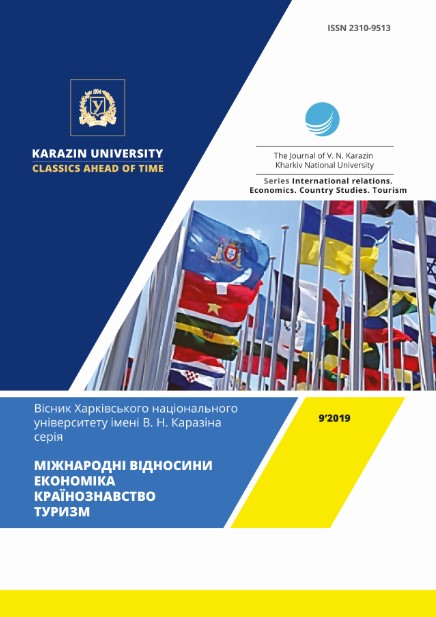Perspectives of the convergence of domestic and european energy markets in the context of Ukraine`is European integration
Abstract
The article examines the prospects of cooperation between the European Union and Ukraine in the context of the globalization of energy markets. The issues of the most beneficial ways of forming long-term partnerships in the energy sector, which can lead to a strong economic and political partnership, are described in detail. The Ukrainian attempts to borrow the positive features of the European energy sector are analized here. The aim of the work is to study theoretical aspects, generalization of methodological approaches to substantiate ways to improve the functioning of the Ukrainian energy market in the way of its convergence with the EU energy market. The tasks that stemming from this goal, which were decided during the study, are to examine the process of convergence of the Ukrainian and European energy markets and to find and suggest ways to accelerate this process. The object of the study is the process of convergence of Ukrainian and the EU energy markets. In analyzing the tendencies of integration of Ukrainian energy market into the energy market of the European Union, the methods of statistical grouping and logical analysis were used. The results of the study are as follows. Convergence of the European and domestic energy markets will contribute to expanding Ukraine's fuel self-sufficiency, as the introduction of new technologies borrowed from European partners will intensify. It will also create a legal basis for expanding trade turnover and investment flows in the field of energy resources for each of the players within international relations, will form the basis for creating a common economic space between the partners. Conclusions. The first opportunity for Ukraine is to use the EU experience in creating a stable energy market, as well as its system of regulation; modernizing the economy and using the European experience of institutional development.
Downloads
References
Barannik, V.O., Zemlyany`j, M.G., Shevczov, A.I. (1999) Yevropejs`ky`j energety`chny`j sektor ta perspekty`vy` Ukrayiny`: Anality`chny`j material. Vzyato z http://www.db.niss.gov.ua/docs/energy/88.pdf.
By`znes Cenzor (2018, fevral` 5) Energoyemnist` ekonomiky` Ukrayiny`, abo chomu do Yevropy` shhe daleko. Vzyato z: https://biz.censor.net.ua/m3048408.
VGOLOS (2018). Rumuns`ka kompaniya xoche pobuduvaty` v Ukrayini gazoprovid vartistyu 125 mln yevro Vzyato z http://vgolos.com.ua/news/327856-revision-v1_331006.html.
Obzor proektov INOGATE. Vzyato s http://www.inogate.org/projects?collection=1996_2008&lang=ru.
Stel`mashhuk, A.M. (2016). Sutnisna xaraktery`sty`ka, peredumovy` i zasady` transkordonnoyi konvergenciyi mizh Ukrayinoyu ta YeS. Innovacijna ekonomika, 7-8, 7-17.2
Ukraina na evropejskih rynkah: vzglyad ehkspertov. Vzyato s: http://old.razumkov.org.ua/ukr/article.php?news_id=96.
European Integration Index 2014 for Eastern Partnership Countries. Retrieved from http://www.eap-index.eu/.
European Commission (2010). Communication from the Commission. Energy 2020.A strategy for competitive, sustainable and secure energy. Retrieved from https://ec.europa.eu/energy/sites/ener/files/documents/2011_energy2020_en_0.pdf.
European Commission (2017). Secure, Clean and Efficient Energy. Retrieved from http://ec.europa.eu/research/horizon2020/pdf/press//fact_sheet_on_energy_in_horizon_2020.pdf.
The New Times (2018, dekabr' 3). Sergej Guriev: «Situaciya v Ukraine gorazdo luchshe, chem to, chto dumayut i pishut ob Ukraine v Rossii». Glavnyj ehkonomist Evropejskogo banka rekonstrukcii i razvitiya – ob ehkonomike Ukrainy spustya pyat' let posle revolyucii dostoinstva. Vzyato s https://newtimes.ru/articles/detail/173903
Authors who publish with this journal agree to the following terms:
- Authors retain copyright and grant the journal right of first publication of this work under the terms of a license Creative Commons Attribution License 4.0 International (CC BY 4.0).
- Authors are able to enter into separate, additional contractual arrangements for the non-exclusive distribution of the journal's published version of the work (e.g., post it to an institutional repository or publish it in a book), with an acknowledgement of its initial publication in this journal.
- Authors are permitted and encouraged to post their work online (e.g., in institutional repositories or on their website) prior to and during the submission process, as it can lead to productive exchanges, as well as earlier and greater citation of published work.




